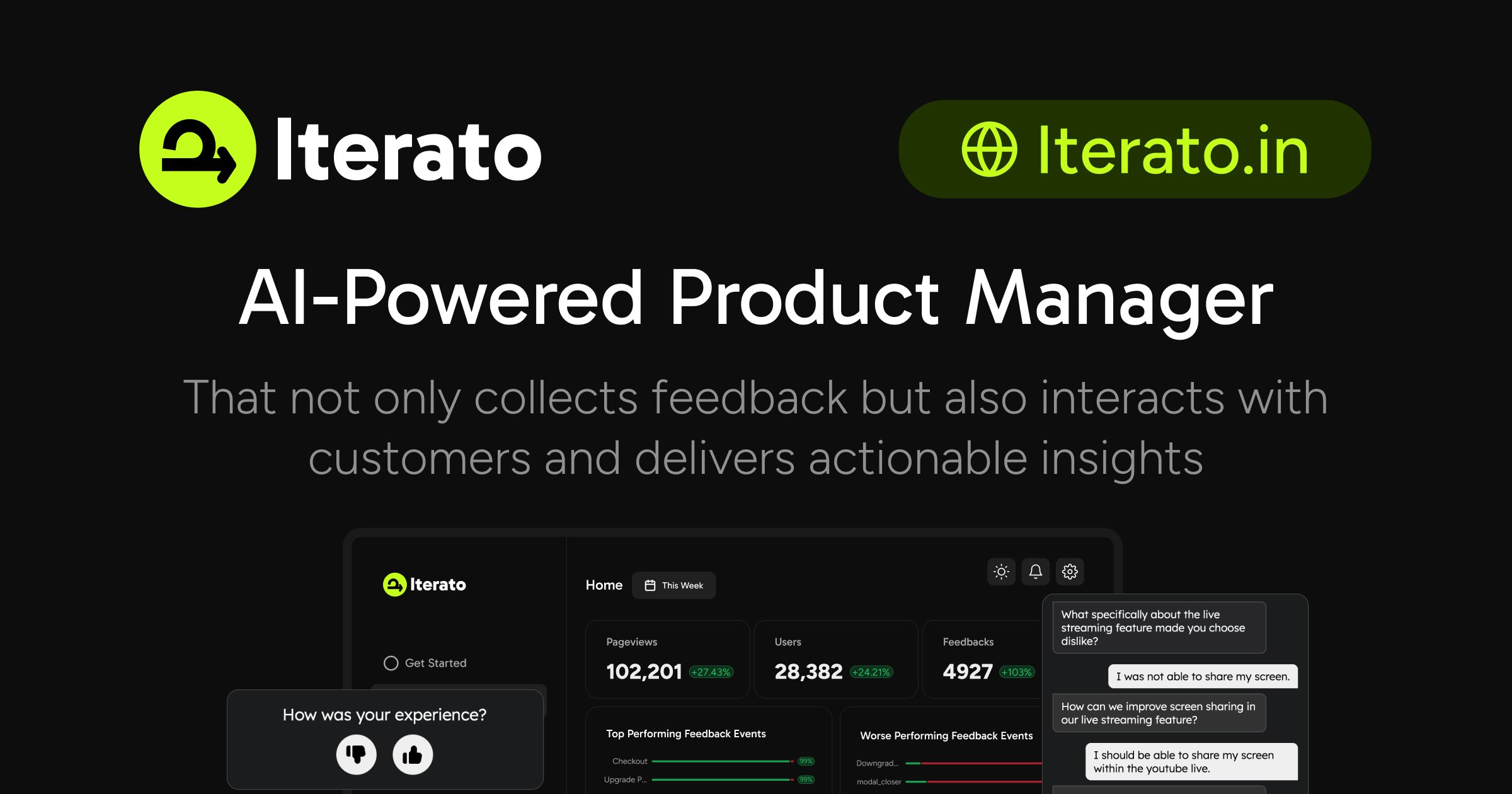Table of Contents
Overview
In today’s fast-paced product development landscape, understanding your users is paramount. Enter Iterato, an AI-powered feedback analysis tool designed to bridge the gap between product teams and user insights. Iterato goes beyond simple surveys, engaging users in dynamic conversations, capturing valuable qualitative feedback, and transforming it into actionable intelligence. Think of it as having an AI product manager that’s always on, helping you refine your offerings through direct user dialogue.
Key Features
Iterato boasts a powerful suite of features designed to streamline the feedback process:
- AI-driven user conversations: Automate engaging dialogues with users across various touchpoints to gather rich, qualitative feedback.
- Qualitative feedback analysis: Leverage AI to analyze the sentiment and content of user feedback, identifying key themes and patterns.
- Insight extraction and trend spotting: Uncover hidden insights and emerging trends within user feedback to inform product decisions.
- Dashboard for product teams: Provide product teams with a centralized dashboard to visualize feedback, track progress, and collaborate effectively.
- Multi-channel feedback collection: Gather feedback from a variety of sources, including in-app messages, email, and more, for a comprehensive view of user sentiment.
How It Works
Iterato simplifies the process of gathering and analyzing user feedback. The platform conducts automated conversations with users across various touchpoints, seamlessly integrating into your existing workflows. Using sophisticated natural language understanding, Iterato analyzes the sentiment and content of the feedback received. It then organizes these insights into easily digestible themes and prioritizes them for product teams, enabling data-driven decision-making. This streamlined process ensures that valuable user feedback is never overlooked.
Use Cases
Iterato can be applied across a wide range of scenarios to enhance product development and user experience:
- Continuous product improvement: Regularly gather feedback to identify areas for improvement and iterate on your product based on real user needs.
- Customer pain point discovery: Uncover hidden pain points and frustrations experienced by users to address critical issues and improve satisfaction.
- UX and feature feedback gathering: Collect specific feedback on user experience and new features to optimize usability and adoption.
- Strategy alignment through real user input: Ensure product strategy aligns with user needs and expectations by incorporating real-time feedback into the planning process.
Pros & Cons
Like any tool, Iterato has its strengths and weaknesses. Understanding these can help you determine if it’s the right fit for your needs.
Advantages
- Mimics human product management, providing a more nuanced understanding of user needs.
- Speeds up feedback cycles, allowing for faster iteration and improvement.
- Scales qualitative research, enabling you to gather insights from a larger user base.
Disadvantages
- May miss nuanced feedback tone, requiring occasional human review.
- Dependent on user engagement, as the quality of insights relies on user participation.
How Does It Compare?
The market offers several feedback analysis tools, each with its own strengths. Here’s how Iterato stacks up against some of its competitors:
- UserVoice: Focuses on traditional feedback boards, which can be less engaging than Iterato’s conversational approach.
- Maze: Primarily geared towards surveys and UX tests, lacking the depth of qualitative analysis offered by Iterato.
- Dovetail: Offers strong qualitative analysis capabilities but lacks the conversational AI features that make Iterato unique. Iterato’s conversational approach and AI-driven analysis distinguish it from these alternatives.
Final Thoughts
Iterato presents a compelling solution for businesses seeking to deeply understand their users and drive product improvement through direct feedback. Its AI-powered conversational approach, combined with robust analysis capabilities, offers a unique advantage in the competitive landscape of feedback analysis tools. While it’s not without its limitations, Iterato’s potential to accelerate feedback cycles and scale qualitative research makes it a valuable asset for product teams looking to build user-centric products.
